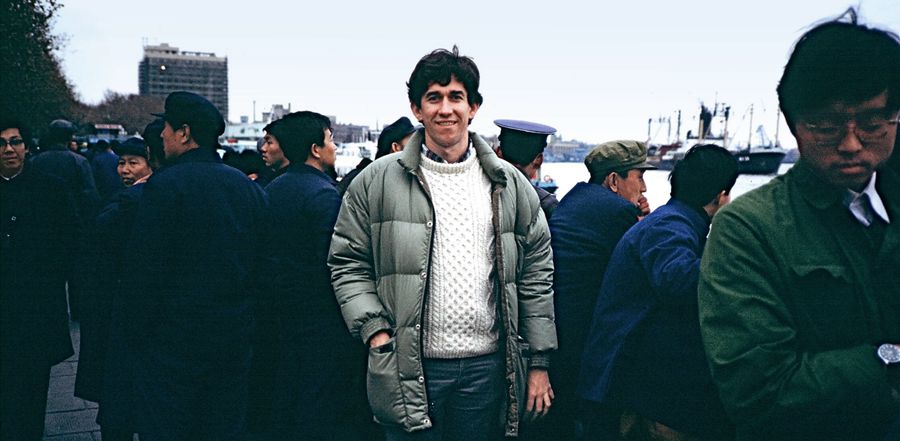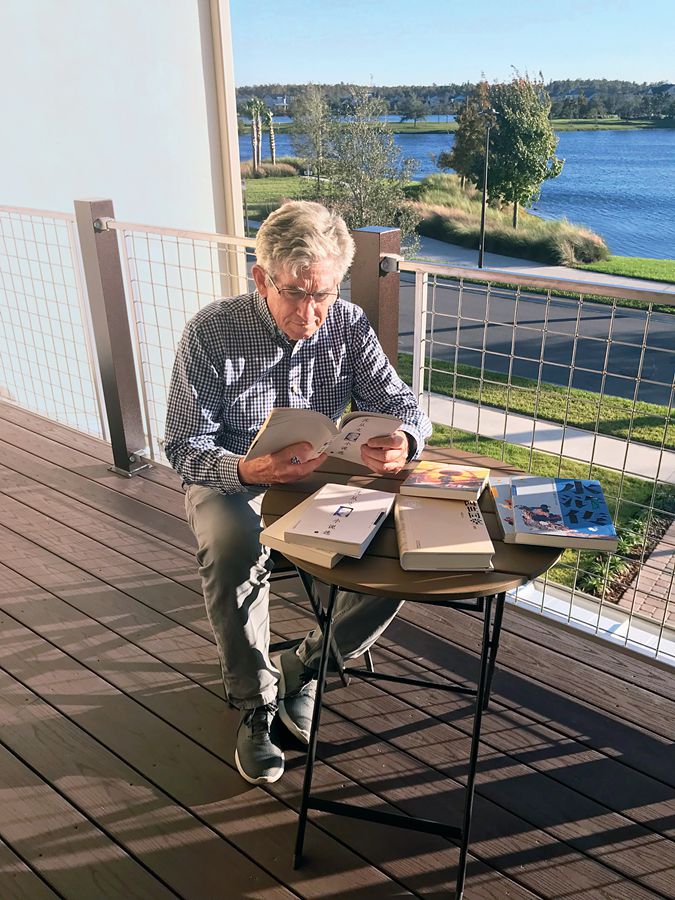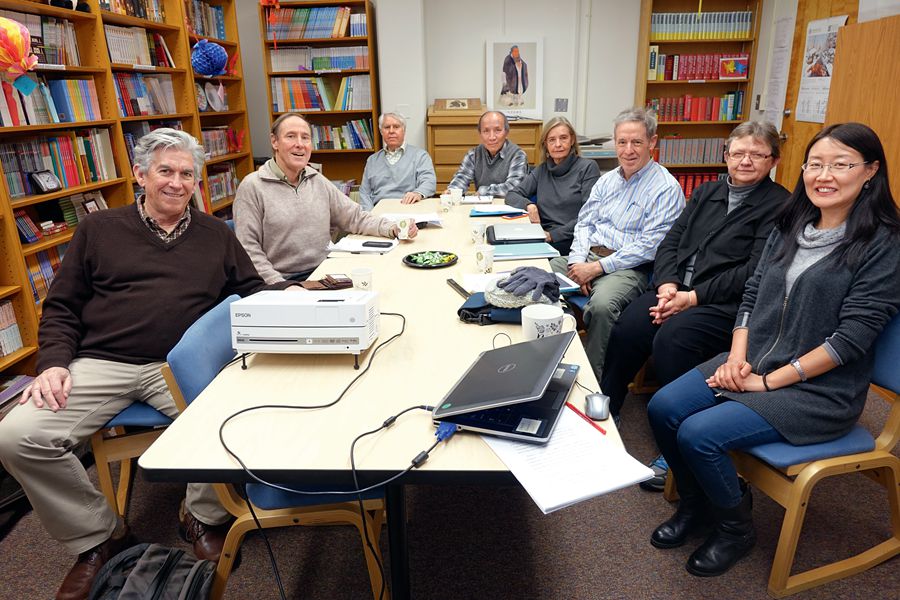“NOTHING, not even mountains and oceans, can separate people with shared goals and vision.” Dennis Delehanty, a 66-year-old alumnus of the Confucius Institute at George Mason University, cited this ancient Chinese saying when narrating his story of learning Chinese and falling in love with Chinese literature. Delehanty served as the director for Postal Affairs in the U.S. Department of State. This retired diplomat also has a Chinese name, Dai Danyi, which literally means one should keep a brave heart to serve justice.
Early Connections with China
Before going to college in the 1960s, Delehanty had already learned Russian, French, and Spanish. He then resolved to take up the study of Chinese. “Growing up in the suburbs south of Boston, I fell under the grip of the tantalizing mysteries of the Chinese language.”
Unfortunately, the college he studied at in Maine offered no Chinese courses. After graduation from college, undeterred, Delehanty enrolled in an evening course at the Cambridge Center for Adult Education near Harvard University. Soon he discovered that learning Chinese was not that easy, and thus started a haphazard, often frustrating, journey in the study of Chinese.
Delehanty on another visit to Shanghai in December 1984.
In 1983, Delehanty visited China – the mysterious nation in his heart – for the first time, and learned Chinese for a short period in what is known today as the Shanghai International Studies University. During his time there, he became obsessed with Chinese culture. Through the ensuing decades, a dozen of business trips to China afforded practical linguistic encouragement for his continued efforts to master the language. Those experiences made Delehanty a witness of the country transforming itself from a country of bicycles in the early 1980s to a modern country of skyscrapers today.
His connection with China grew even stronger when his daughter took up the study of Chinese and soon won the scholarship from the Confucius Institute at Mason to study the language at the Beijing Language and Culture University. After her graduation in 2011, she remained in Beijing, working there till 2015. “My daughter, quite by accident, began to learn Chinese, but it was not because of my influence,” Delehanty underscored. “China is a magnet for my family members.”
In 2012, Delehanty retired from the U.S. Department of State, winding up a 37-year-long career in government. He began to attend weekly presentations about Chinese affairs sponsored by the Confucius Institute at Mason. By late 2014, this casual contact had led to the formation of a Chinese Reading Club at the institute, which by mid-2016 had boasted six experienced Chinese learners who could read and discuss advanced literary works of such esteemed Chinese authors as Lu Xun, Lao She, Ba Jin, Shen Congwen, Mo Yan, Liu Zhenyun, Bi Feiyu, and Su Tong. Delehanty said, “From those classic masterpieces, we can learn from the brilliant Chinese culture and its people’s character of kindness and toughness.”
Dennis Delehanty, a 76-year-old alumnus of the Confucius Institute at George Mason University.
Delehanty still remembers the first time he read an original work of Chinese literature. “One day while I was in a Beijing bookstore, I was just browsing and wondering which book I should pick. Then a book with illustrations suddenly attracted me which I immediately decided to buy. It was when I got on the plane that I discovered the book was The Strange Tales of Liao Zhai.” It is a collection of about 500 stories written by Pu Songling of the Qing Dynasty (1644-1911).
“Chinese literature is very interesting. There are not only the Four Great Classic Novels – Journey to the West, Outlaw of the Marsh, Romance of the Three Kingdoms and Dream of the Red Chamber; but also a large number of modern and contemporary works,” Delehanty enumerated. “In a sense, Lu Xun is the father of China’s modern literature. He is like the William Shakespeare of Chinese literature. I also like reading the works of Lao She and Ba Jin, but my favorite one is Border Town written by Shen Congwen.” Delehanty disagrees with those who complain that Shen’s writing style is too simple. On the contrary, he can paint a vivid picture in his mind and easily feel the beauty of Shen’s hometown in the west of Hunan Province, even though he has never been there.
Fluent in seven languages, Delehanty kept on reading classical novels. “When I talk with Chinese people, usually I don’t quite catch their real meaning. But Chinese literature offers me a way to read local people’s minds, and I can naturally understand the story and the characters’ thinking. That was the feeling I got reading Ba Jin’s Cold Night.”
The Chinese Reading Club at the George Mason’s Confucius Institute was formed in late 2014.
In Delehanty’s eyes, the biweekly group meetings to decipher the cultural, linguistic, and literary secrets of the short stories in Chinese were full of challenges and joys. “This experience has brought us to a deeper understanding of China and the Chinese mind through modern literature – even to those in our group who have lived in China or studied Chinese for decades,” Delehanty said.
Personally, Delehanty felt grateful for the opportunity the Confucius Institute has provided to advanced learners of Chinese through the reading group. He suggested that the Confucius Institute at Mason consider promoting the model of this reading group to other Confucius Institutes in the U.S. and the rest of the world, as more and more Westerners embark on the wonderful voyage to learn the world’s most spoken language.
In today’s world, China plays an increasingly important role, Delehanty told China Today. “It is vital for China to communicate with and establish a link with the world. Therefore, learning Chinese at Confucius Institutes is a good choice.”
Each of the signing and opening ceremonies which Confucius Institutes hold overseas impressed Delehanty. He appreciated this long-term plan to teach Chinese to people worldwide. “Chinese people and the people of the world are closely connected through the efforts of the Confucius Institute, which promotes the linguistic connection and strengthens the people-to-people ties, a great contribution to all mankind.”
Discussing the future of the Confucius Institute, Delehanty hopes that it can provide more challenging curriculum, implementing courses from Chinese language to literature, culture, philosophy and history to meet the needs of those advanced learners. “If one day there was a philosophy course, I would encourage my friends to attend it.”
“It is my lifelong ideal that people around the world should establish mutual understanding, respect for each other, peaceful co-existence and sincere cooperation,” Delehanty concluded.
Delehanty’s connection with China grew even stronger when his daughter took up the study of Chinese.


